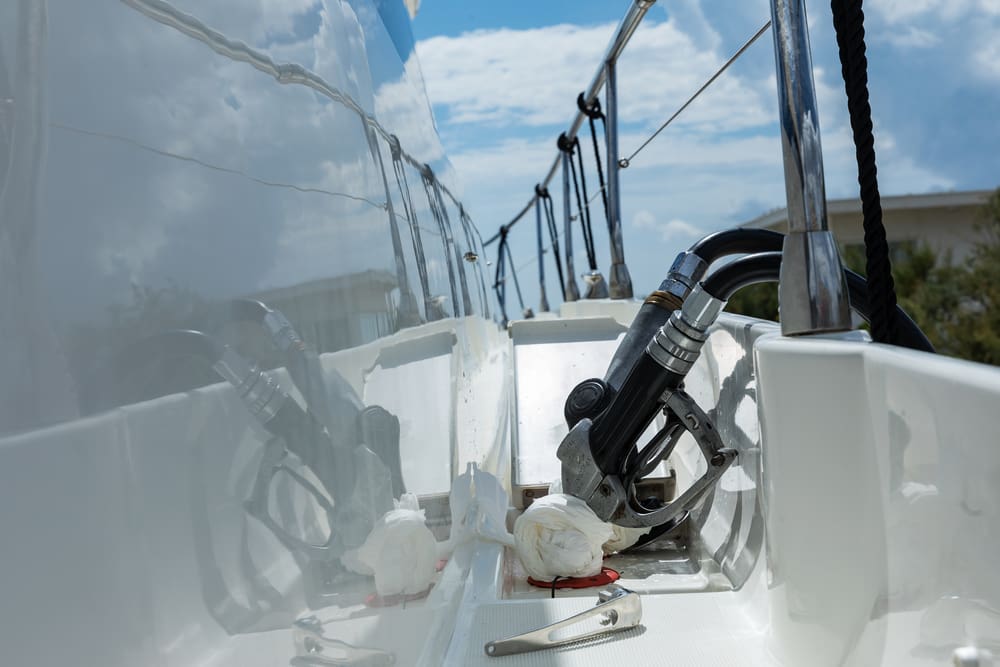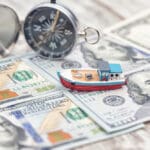The boating season is here, meaning that hundreds of boaters are going to be launching for the first time this year. As excited as you are, this is also the time to start thinking about calculating boat fuel consumption and cost. Understanding the amount of fuel your boat engine burns is important, because it not only helps you figure out a budget, but also how far you can go on your next boating adventure.
How to Estimate Your Boat’s Fuel Burn
Sea conditions are much more unpredictable than those of a roadway, so the time it takes to travel a set distance tends to vary greatly. For that reason, gallons per hour are used to measure fuel consumption. Many engines these days will produce fuel flow readouts, so you can figure out how much fuel your boat is consuming. That said, it is important to estimate how much fuel your boat is going to consume prior to purchasing the vessel or a new engine.
Fuel Consumption Formula
Fuel efficiency is measured in pounds of fuel consumed per horsepower generated per hour. Boaters call this “brake-specific fuel consumption.”
If it sounds confusing, don’t worry. All this will be broken down below.
First, consider the kind of fuel your engine uses. Gasoline weighs 6.1 pounds per 1 gallon. A maintained four-stroke gasoline engine burns about 0.50 pounds of fuel every hour per one unit of horsepower. Diesel weighs 7.2 pounds per gallon and burns about 0.4 pounds of fuel every hour for a unit of horsepower.
These might seem like simple numbers to use for calculations, but it is not that simple. Calculating fuel consumption can be rather challenging by hand. You can use an online calculator to simplify the steps.
Here is the formula for calculating maximum fuel consumption:
Gallons per hour (GPH) = (specific fuel consumption x horsepower)/Fuel Specific Weight
So if you are using a diesel engine with 300 horsepower (HP), here is what the formula looks like:
- GPH = (0.4×300)/7.2
- GPH = 120/7.2
- GPH = 16.6
Similarly, for a gasoline marine engine with the same horsepower:
- GPH = (0.5×300)/6.1
- GPH = 150/6.1
- GPH = 24.5
By multiplying the GPH by the average cost of boat fuel, you can then figure out how much boat fuel will cost for your trip.
You can also plug in some of the following points:
- Distance of the journey
- Cruising speed
- Fuel price
For example, if a 300-HP diesel engine is burning between 16-17 gallons per hour, and you know your trip is going to take around 5 hours, based on your cruising speed, you know that 80-85 gallons of fuel will be needed. If you are spending around $7.50 for diesel fuel for your boat, then it will be $576 to $612 for that trip.
Other Factors That Influence Energy Consumption
There are a couple of factors that can increase or decrease the fuel consumed by your boat or yacht.
Hull Shape
The three different hull shapes—full displacement, semi-displacement, and planing—can add to fuel economy. These shapes also respond differently to various speeds. For example, a full displacement ship sits in the water and rides between waves that are between bow and stern. So, when the speed demands are increased, fuel consumption sharply increases.
Semi-displacement and planing hulls apply loads of horsepower to climb up waves, but this makes fuel consumption skyrocket. When the bow is pointing down, the speed increases, and the fuel burn decreases.
Friction and Drag
Worn-bearing bindings and engine misalignment are just two things that can bring about friction. Furthermore, a neglected propeller and growths on the hull will increase drag. You can test for friction and drag by running a wide-open throttle (WOT) test and comparing the RPM. For instance, if you routinely reach 3,000 RPM but suddenly end up with an average of 2,850 RPM, something is wrong.
Extra friction and drag can increase fuel consumption by up to 17% or more.
Horsepower
The more horsepower a boat can produce, the better the fuel economy. Since less RPM is needed to maintain a higher speed, the gallons needed are decreased. Therefore, if you are wavering between a smaller, less powerful engine or a larger one, it is recommended that you choose one with a bit more horsepower.
Looking For Your Dream Boat?
When it comes to calculating boat fuel costs, it is important to know that your cruising speed has the greatest influence on fuel economy. No matter at which speed you cruise, though, your boat is going to consume fuel during use. Are you looking for a fuel-efficient boat? Consider speaking with the Yacht Brokers of Annapolis. Our experienced team can help you find the boat of your dreams, so give us a call or send us a message today.





